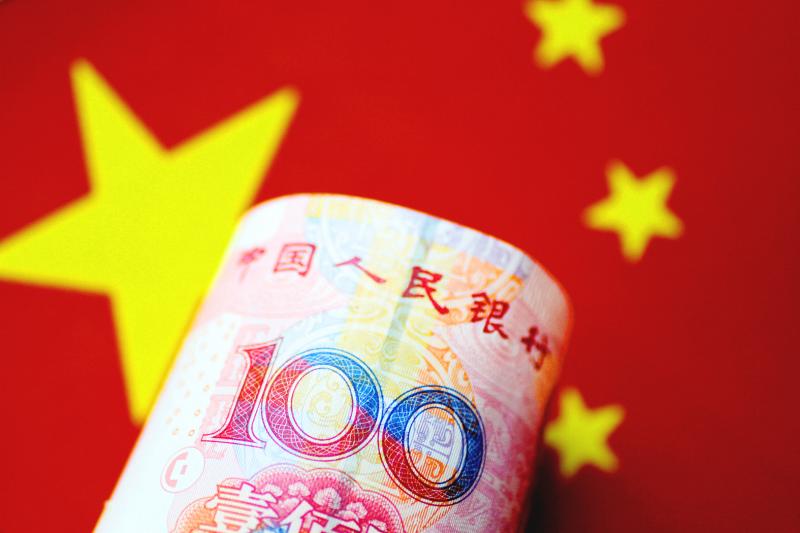The Ministry of Economic Affairs yesterday announced a draft bill that would ban Chinese-funded companies from operating research and development (R&D) offices in Taiwan, while toughening rules governing Chinese for-profit businesses establishing subsidiaries in the nation.
The draft amendments to the Measures to Approve Chinese For-profit Businesses Establishing Subsidiaries or Offices in Taiwan (大陸地區之營利事業在臺設立分公司或辦事處許可辦法) state that no Chinese-funded companies may perform R&D activities in Taiwan, with the bill defining “research” as “conducting or compiling market-related analysis and statistics,” the ministry said.
If passed, the bill would change the name of the law to Measures for Approving Chinese For-profit Businesses or its For-profit Business in a Third-party Region Establishing Subsidiaries in Taiwan (大陸地區之營利事業或其於第三地區投資之營利事業在臺設立分公司或辦事處許可辦法), it said.

Photo: Reuters
The bill references the Measures Governing Investment Permits to the People of the Mainland Area (大陸地區人民來臺投資許可辦法) in defining what constitutes a “Chinese for-profit company.”
If 30 percent of a company in a third-party region is directly or indirectly owned by a Chinese firm, or if a Chinese firm could control the entity in a third-party region, that company would be considered a Chinese for-profit enterprise and the Foreign Nationals Investment Act (外國人投資條例) would not apply to it, the ministry said.
The draft amendments would also include clauses to further restrict Chinese companies from headhunting Taiwanese R&D talent, it said.
The ministry cited a Ministry of Justice Investigation Bureau probe, which found that 10 Chinese companies had illegally established a subsidiary or R&D branch in Taiwan by pretending to be foreign investors or Taiwanese companies in an attempt to poach talent from Taiwan’s high-tech industries.
The bureau report said that some Chinese companies attempted to pass themselves off as personal offices, subsidiaries of parent companies or belonging to companies established in a third-party region.
Officials said that the draft amendments would allow the government to take a tougher stance on preventing Chinese companies from systematically poaching talent from Taiwanese companies, which could affect the nation’s economic development and national security.
The amendments would also prevent Chinese companies from “launching operations” without officially registering with the government, they added.

INVESTIGATION: The case is the latest instance of a DPP figure being implicated in an espionage network accused of allegedly leaking information to Chinese intelligence Democratic Progressive Party (DPP) member Ho Jen-chieh (何仁傑) was detained and held incommunicado yesterday on suspicion of spying for China during his tenure as assistant to then-minister of foreign affairs Joseph Wu (吳釗燮). The Taipei District Prosecutors’ Office said Ho was implicated during its investigation into alleged spying activities by former Presidential Office consultant Wu Shang-yu (吳尚雨). Prosecutors said there is reason to believe Ho breached the National Security Act (國家安全法) by leaking classified Ministry of Foreign Affairs information to Chinese intelligence. Following interrogation, prosecutors petitioned the Taipei District Court to detain Ho, citing concerns over potential collusion or tampering of evidence. The

‘FORM OF PROTEST’: The German Institute Taipei said it was ‘shocked’ to see Nazi symbolism used in connection with political aims as it condemned the incident Sung Chien-liang (宋建樑), who led efforts to recall Democratic Progressive Party (DPP) Legislator Lee Kun-cheng (李坤城), was released on bail of NT$80,000 yesterday amid an outcry over a Nazi armband he wore to questioning the night before. Sung arrived at the New Taipei City District Prosecutors’ Office for questioning in a recall petition forgery case on Tuesday night wearing a red armband bearing a swastika, carrying a copy of Adolf Hitler’s Mein Kampf and giving a Nazi salute. Sung left the building at 1:15am without the armband and apparently covering the book with a coat. This is a serious international scandal and Chinese

Seventy percent of middle and elementary schools now conduct English classes entirely in English, the Ministry of Education said, as it encourages schools nationwide to adopt this practice Minister of Education (MOE) Cheng Ying-yao (鄭英耀) is scheduled to present a report on the government’s bilingual education policy to the Legislative Yuan’s Education and Culture Committee today. The report would outline strategies aimed at expanding access to education, reducing regional disparities and improving talent cultivation. Implementation of bilingual education policies has varied across local governments, occasionally drawing public criticism. For example, some schools have required teachers of non-English subjects to pass English proficiency

TRADE: The premier pledged safeguards on ‘Made in Taiwan’ labeling, anti-dumping measures and stricter export controls to strengthen its position in trade talks Products labeled “made in Taiwan” must be genuinely made in Taiwan, Premier Cho Jung-tai (卓榮泰) said yesterday, vowing to enforce strict safeguards against “origin laundering” and initiate anti-dumping investigations to prevent China dumping its products in Taiwan. Cho made the remarks in a discussion session with representatives from industries in Kaohsiung. In response to the US government’s recent announcement of “reciprocal” tariffs on its trading partners, President William Lai (賴清德) and Cho last week began a series of consultations with industry leaders nationwide to gather feedback and address concerns. Taiwanese and US officials held a videoconference on Friday evening to discuss the